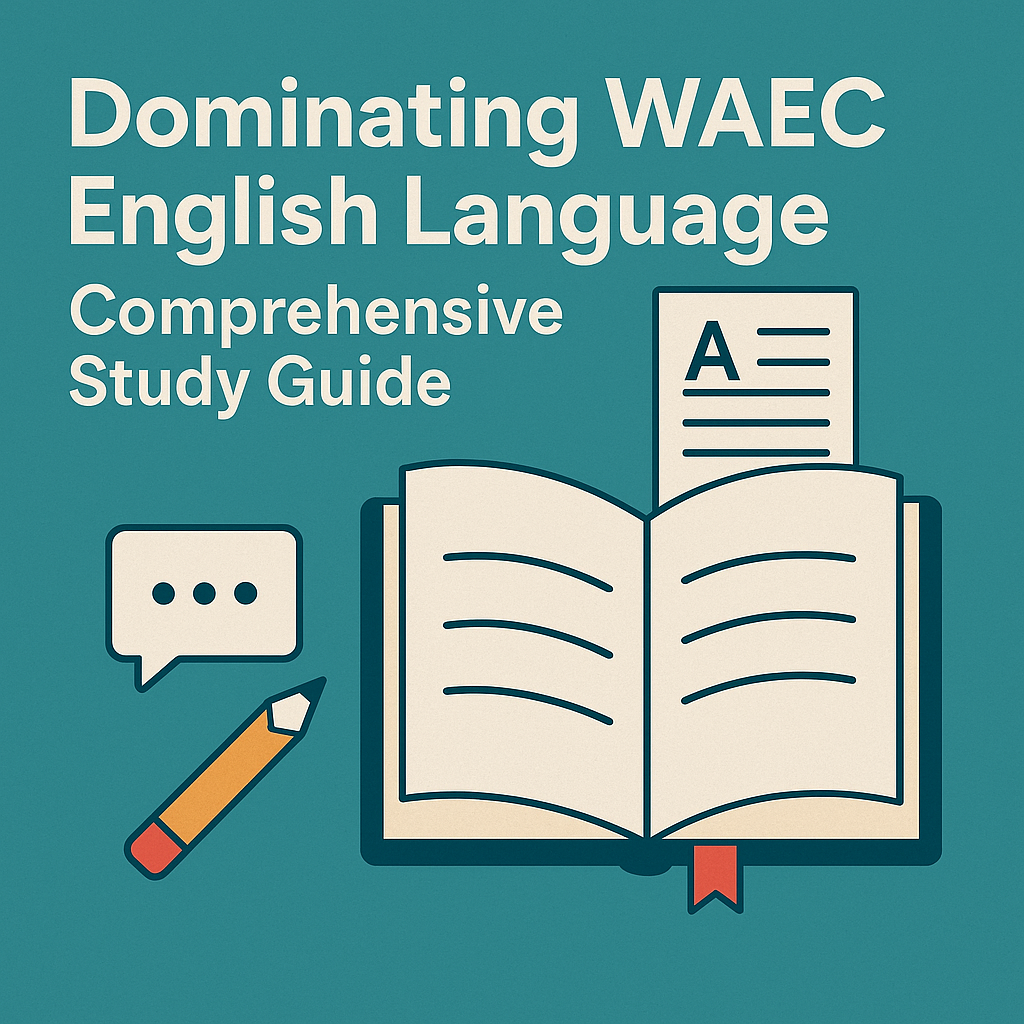1. Introduction
The WAEC English Language exam is a pivotal hurdle for secondary school students, assessing comprehension, writing, grammar, and usage. High performance here not only secures credit in English but also strengthens performance in other subjects and paves the way for university admissions.
This guide offers an all encompassing roadmap: understand exam structure, master comprehension strategies, sharpen writing skills, and solidify grammar fundamentals. We’ll dissect question types, provide targeted practice drills, and recommend key resources to ensure you enter the exam hall with confidence.
Embrace active reading, strategic planning, and consistent practice to transform English from a daunting challenge into a scoring opportunity. Let’s unlock your WAEC English potential.
2. Deep Dive: Exam Structure & Component Breakdown
2.1 Paper 1: Objective Test
- Sections: Comprehension (passages & poetry), Grammar & Vocabulary, Cloze Test, Oral Forms.
- Scoring: 70 marks; high weight on comprehension.
2.2 Paper 2: Essay & Literature
- Sections: Essay (narrative, argumentative, discursive), Literature (poetry, drama, prose).
- Scoring: 80 marks; emphasis on content, coherence, and language.
2.3 Time Allocation
- Paper 1: 2 hours (60 minutes for comprehension, 30 minutes for grammar & vocabulary, 15 minutes for cloze, 15 minutes for oral forms).
- Paper 2: 2 hours (45 minutes for essay, 75 minutes for literature questions).
3. Exam Strategy Tips
3.1 Comprehension Mastery
- Active Reading: Annotate themes, tone, and literary devices.
- Question First: Glance at questions, then read passage for answers.
- Inference Techniques: Look for context clues and author’s intent.
3.2 Essay Writing Excellence
- Choosing Topics: Evaluate prompts for personal experience or strong arguments.
- Planning: Spend 10 minutes outlining (introduction, 3 body points, conclusion).
- Language Use: Vary sentence structures; use idioms and rhetorical questions.
3.3 Grammar & Usage Drills
- Error Spotting: Circle key words, scan for agreement issues and misplaced modifiers.
- Vocabulary Enhancement: Integrate high-level words; avoid repetition.
3.4 Literature Section Techniques
- Contextual Analysis: Understand historical background of works.
- Textual Evidence: Quote accurately and analyze significance.
4. Subject-Specific Overview
4.1 Comprehension Skills
- Genres: Distinguish between narrative, descriptive, expository.
- Poetry Analysis: Identify meter, rhyme scheme, imagery.
4.2 Writing Skills
- Essay Types: Narrative (storytelling elements), Argumentative (claims, evidence, counterarguments), Discursive (balanced discussion).
- Structure: Introduction with hook, coherent body paragraphs, reflective conclusion.
4.3 Grammar Essentials
- Parts of Speech: Nouns, verbs, adjectives, adverbs, conjunctions.
- Sentence Types: Simple, compound, complex; avoid run-ons.
4.4 Literature Deep Dive
- Drama: Key themes in “Saro the Paver” and “The Lion and the Jewel.”
- Novel: Character analysis in “Things Fall Apart.”
- Poetry: Theme and form in selected Yoruba poetry.
5. Practice & Resources
5.1 Past Question Compilations
- WAEC English Practice by Syndikate Publications
- Spectrum WAEC: English Language Vol. 1–3
5.2 Online Platforms
| Resource | Features | Access |
|---|---|---|
| Mindset Learn | Exam-standard video lessons | Free/Paid |
| PastWAEC.com | Interactive past questions bank | Free |
| YouTube EDU | Poetry and literature analyses | Free |
5.3 Mobile Apps
- WAEC English Prep: Topic quizzes and flashcards.
- Grammarly Keyboard: Real-time grammar checks.
5.4 Mock Exam Routine
- Weekly Paper 1 and Paper 2 timed drills.
- Peer discussion groups to analyze literature responses.
6. Conclusion
Success in WAEC English demands a balanced focus on comprehension, writing, grammar, and literature. By mastering active reading strategies, refining essay planning, polishing grammar, and engaging deeply with literary works, you’ll maximize your score potential.
Develop a consistent practice routine, leverage quality resources, and incorporate feedback through mock exams. Take the first step today: tackle one comprehension passage and draft a 250-word essay on a contemporary topic. Your journey to WAEC English excellence starts now.
